Fox News Flash top headlines for June 15
Fox News Flash top headlines are here. Check out what's clicking on Foxnews.com.
A large majority of voters say the economy is in bad shape. Two-thirds are pessimistic about conditions. Gas and grocery prices are a major problem for most families. And a growing number of voters feel they are losing ground financially.
That’s the grim backdrop for the upcoming midterm elections, according to the latest Fox News national survey.
Forty-seven percent feel they are falling behind financially, up 20 points compared to last June. Some 42% are holding steady, while only 10% are getting ahead.
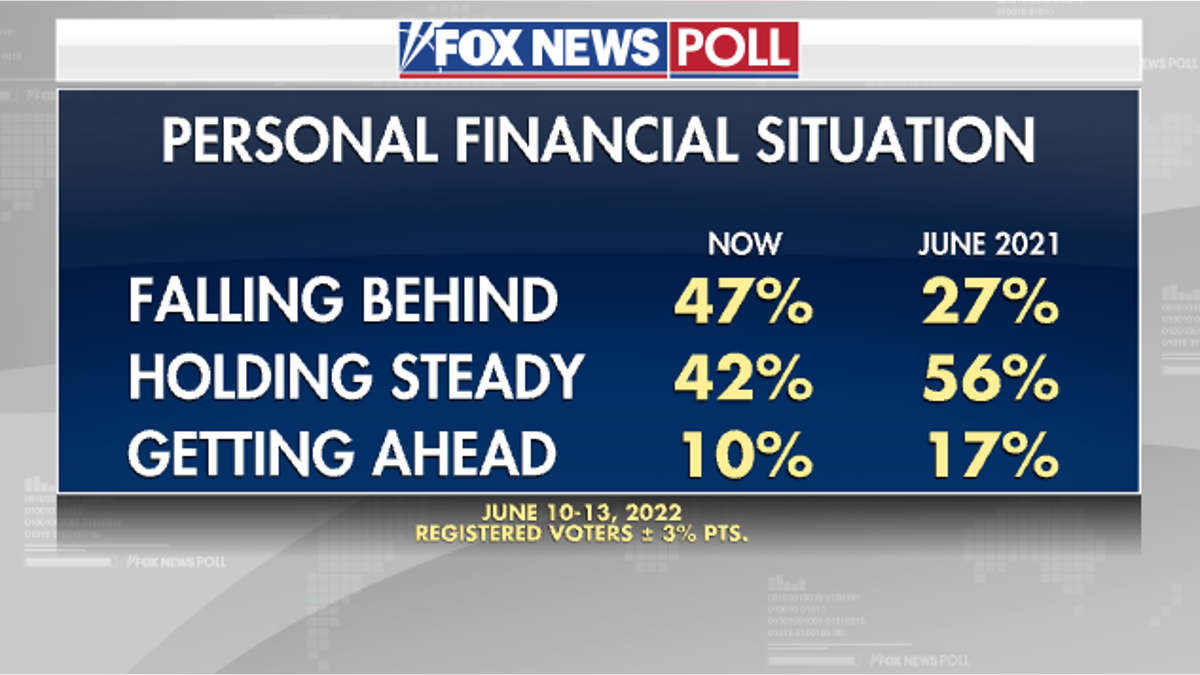
The Personal Finance Poll (Fox News)
Eight-two percent of voters rate the economy negatively, including 57% who describe it as poor -- the highest in a decade.
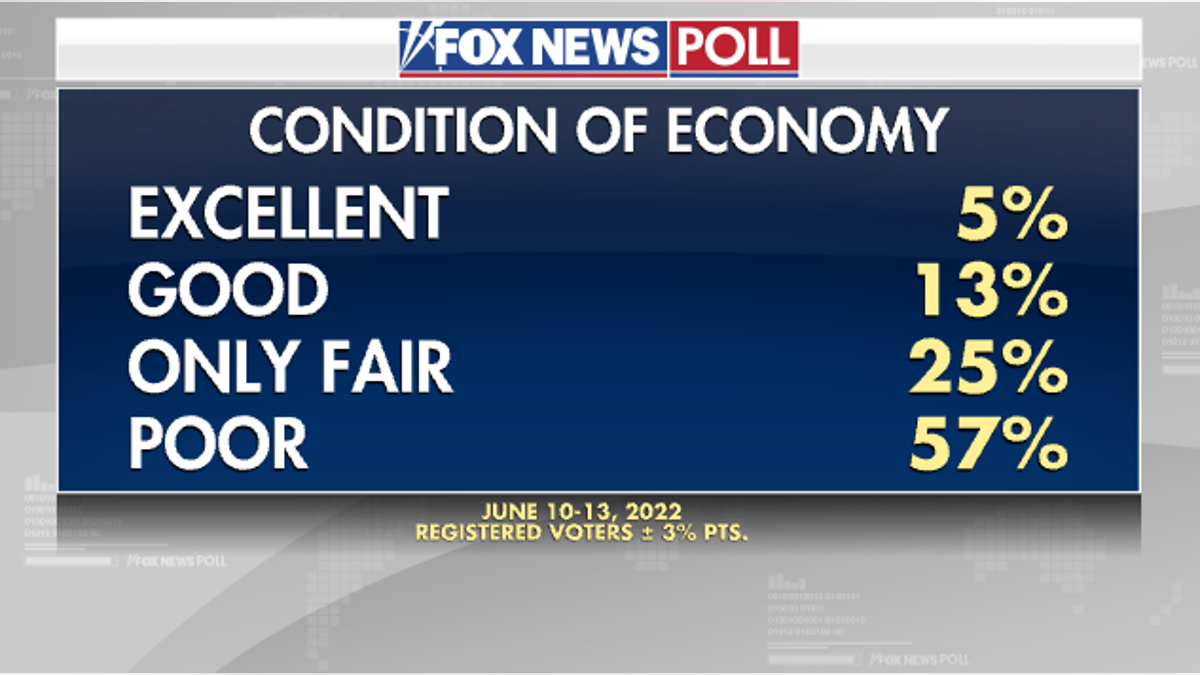
Condition of Economy Poll (Fox News)
When asked to offer a more general assessment of their economic mood, 65% say they feel pessimistic. That’s an 18-point increase since last year, and up 30 points from four years ago.
Nine in 10 report the cost of food and gas are a problem for their family. That includes majorities who say current grocery (55%) and gas prices (67%) are a "major" problem. For voters in households earning less than $50,000 annually, nearly three-quarters call gas prices a major problem (72%). And by a 50-32% margin, more voters say President Biden’s policies are responsible for current gas prices than blame Russian President Putin’s war with Ukraine.
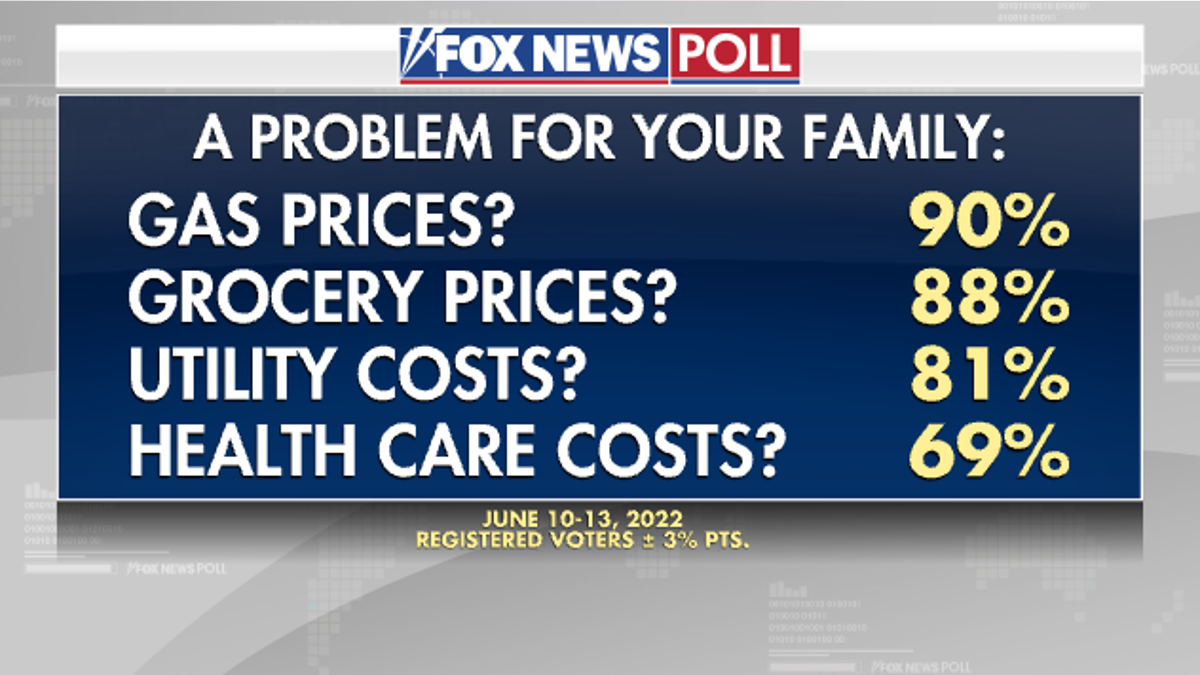
The Problem for your Family Poll (Fox News)
Overall, 41% say inflation will be most important to their vote for Congress. That’s about four times as many as say guns (12%) and abortion (10%). Next, it’s border security (7%), followed by climate change and crime (5% each), election integrity and voting rights (4% each), coronavirus (3%), and foreign policy (1%).
The top election issues for Democrats are inflation (27%), guns (20%), and abortion (12%). For Republicans, it’s mostly about inflation (53%), and to a much lesser degree, border security (12%). Same story among independents, as the largest number say inflation (43%), and far fewer abortion (10%) and guns (10%).
Voters see Democrats as better at handling the issues of climate change (by 15 points), abortion (D+8), voting rights (D+6), election integrity (D+3), and coronavirus (D+3).
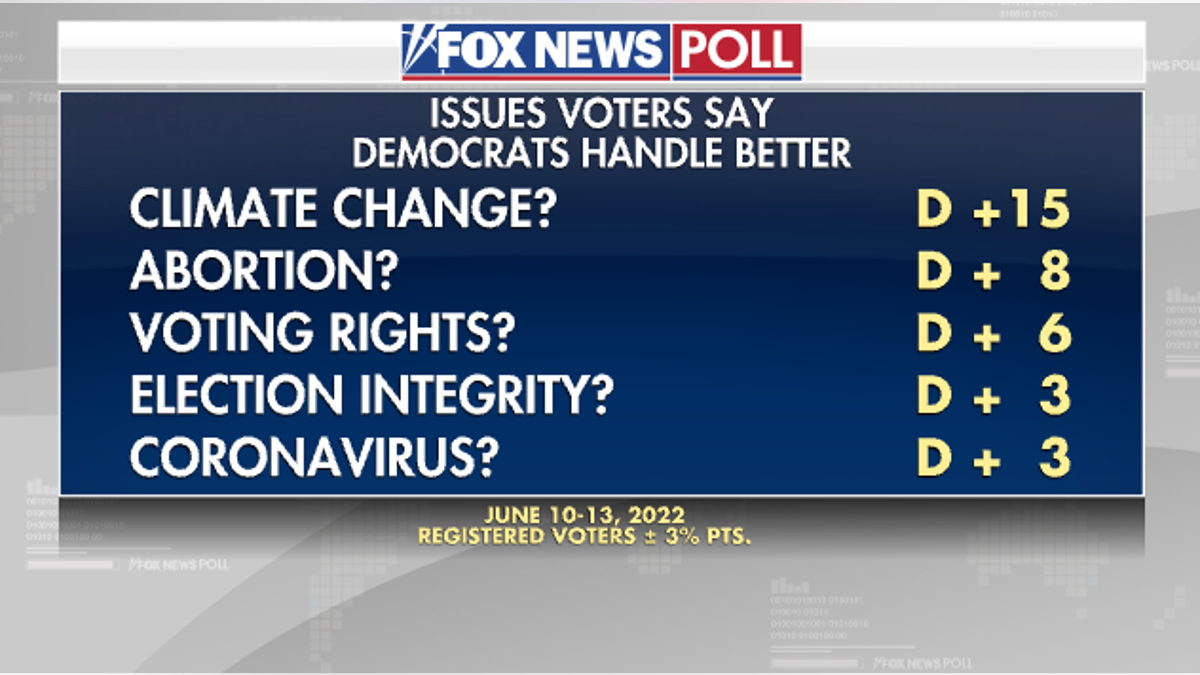
Democrats Handle Better Poll (Fox News)
The Republican issue advantages are larger and, importantly, on the top issue. They are preferred on inflation (R+19 points), border security (R+19), crime (R+13), and foreign policy (R+8).
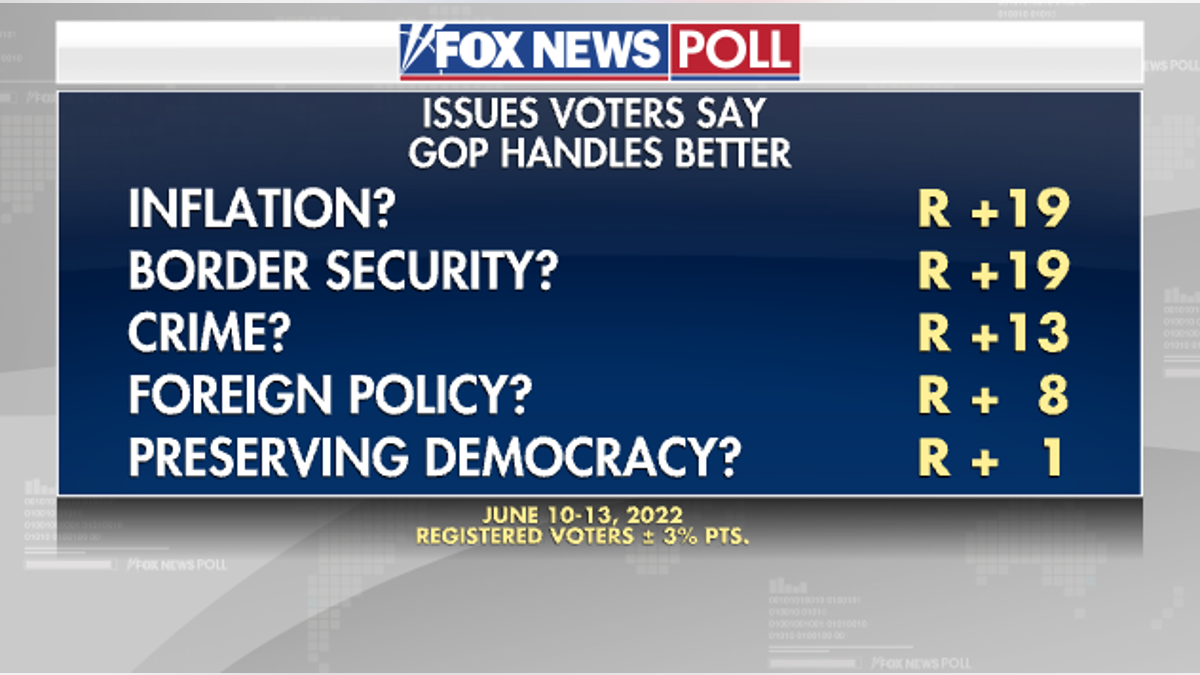
Republicans handle better Poll (Fox News)
It is more evenly divided on preservation of American democracy (R+1), and neither party has an edge on gun policy. In 2018, the last time Fox asked this gun policy question, more voters trusted Democrats to handle the issue by a 3-point margin.
The Republican advantage on inflation comes mainly from a 30-point preference among independents. Some 17% of Democrats also say the GOP is better on the issue. Yet the highest defection among Democrats, 19%, is on border security.
Similar numbers of Republicans trust Democrats more on climate change (18%) and abortion (15%).
About equal numbers of Democrats (44%) and Republicans (47%) say they feel more enthused to vote this year than usual.
"This poll shows that the expected overturning of Roe and the increased focus on gun policy creates some openings for Democratic candidates that may not have been there before," says Democratic pollster Chris Anderson, whose firm Beacon Research conducts the Fox News survey with Republican pollster Daron Shaw.
"These issues provide concrete reasons for some voters who are disillusioned by Biden and discouraged by inflation to care about supporting Democratic congressional candidates."
The generic ballot test shows voters prefer the Republican candidate to the Democrat in their House district by 47-44%. That is well within the survey’s margin of sampling error. The GOP candidate was up by 7 points in April and by 2 points in March.
Fox News modeling estimates the current GOP 3-point edge would produce a 23-seat gain.
FED RATE HIKE WILL HAVE ‘DEVASTATING’ IMPACT ON CONSUMERS, FORMER HOME DEPOT CEO WARNS
"In historical terms, if the GOP picks up roughly two dozen seats it would be about average for the out-party in a midterm," says Shaw. "However, 2020 Republican gains in the House and pro-Democratic gerrymandering significantly constrain what is possible in 2022, such that some statistical models estimate a 23-seat swing would be comparable to winning 50+ seats in a normal midterm. In other words, given the context of 2022, a Democratic loss of two dozen seats would be -- to paraphrase former President Obama, a shellacking."
In June 2018, four years ago, President Trump’s job rating was negative by 6 points (45-51%), and the generic ballot had Democrats ahead by 9 points (48-39%). The Democrats ultimately gained 41 seats that year.
Biden’s current job rating is negative by 14 points: 43% approve and 57% disapprove. That’s his poorest performance to date and a reversal from last June when his ratings were at a record high 56-43% (+13 points, June 2021). He’s at a new low of 80% approval among Democrats, down from a high of 95% in April 2021.
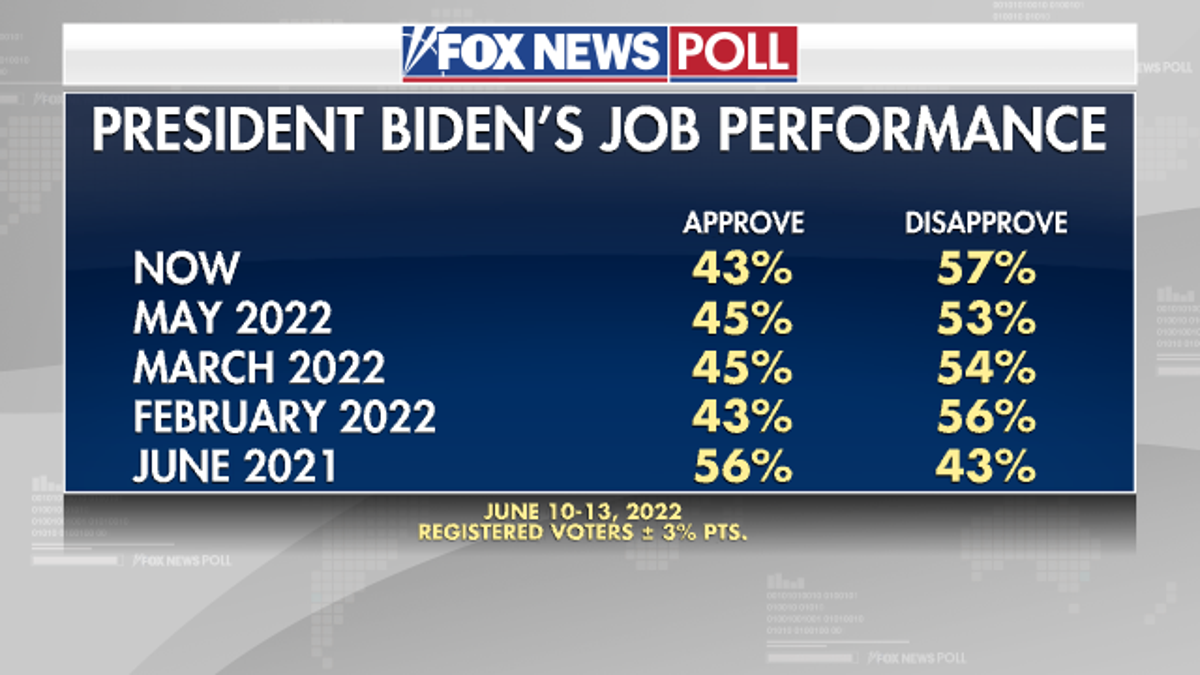
Biden Job Rating ((Fox News))
His ratings on issues are worse. He’s underwater by 48 points on inflation (23% approve, 71% disapprove), by 38 points on the economy generally (29-67%), by 27 points on guns (33-60%), by 23 points on border security (35-58%), and by 10 points on Russia’s invasion of Ukraine (42-52%).
Poll-pourri
Seven in 10 think it is important for Congress and the Justice Department to investigate the January 6, 2021 attack on the U.S. Capitol, including 50% who say it’s very important. The House Select Committee has been investigating the attack for over a year and had its first televised hearings June 9. The poll finds virtually all Democrats (95%) and most independents (70%) think the probe is important. Among Republicans, 48% say important, 49% not important.
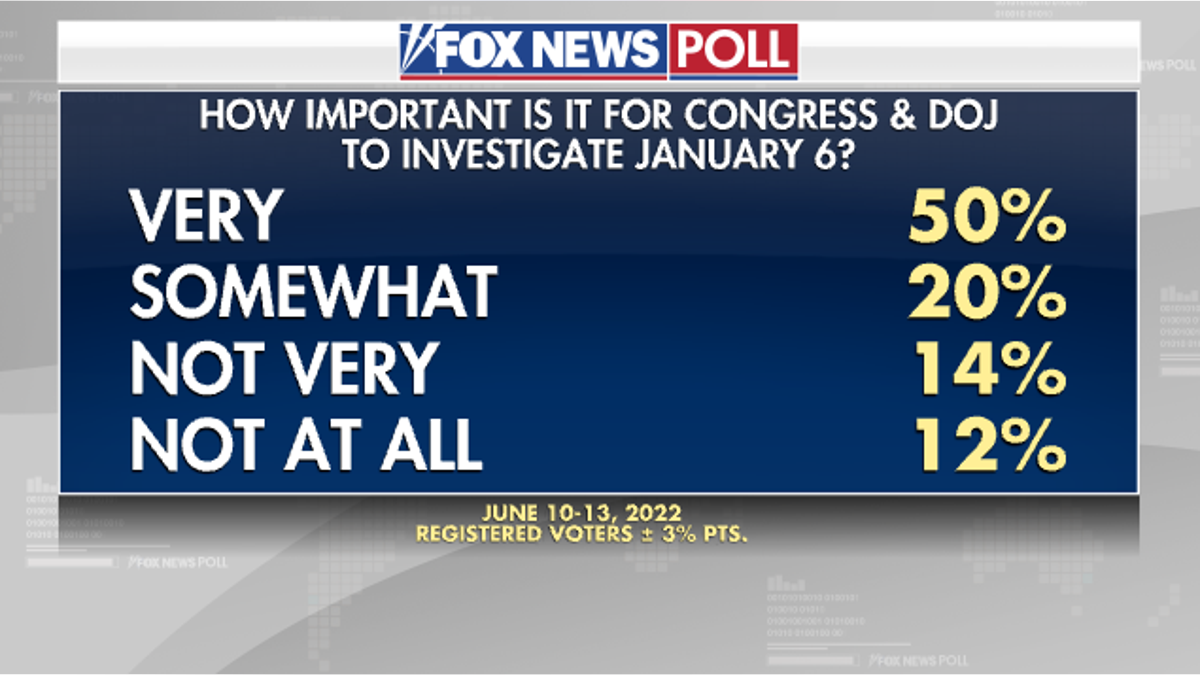
The Jan 6. Importance Poll (Fox News)
Voters are unhappy with Congress, as just 21% approve, while 72% disapprove -- the lowest marks for lawmakers in over two years.
CLICK HERE FOR TOPLINE AND CROSSTABS.
Conducted June 10-13, 2022 under the joint direction of Beacon Research (D) and Shaw & Company Research (R), this Fox News Poll includes interviews with 1,002 registered voters nationwide who were randomly selected from a national voter file and spoke with live interviewers on both landlines and cellphones. The total sample has a margin of sampling error of plus or minus three percentage points.
Fox News’ Victoria Balara contributed to this report.










































